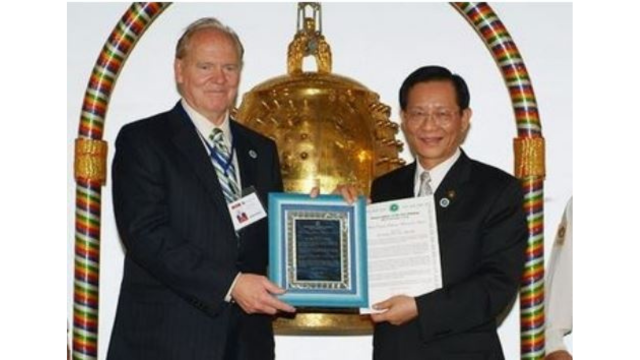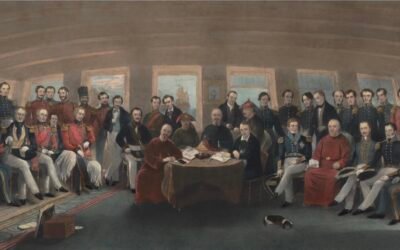The celebration is an opportunity to honor the leaders of the Association of World Citizens and ask the government of Taiwan to effectively implement transitional justice.
by Massimo Introvigne*
*A paper presented via video at the International Forum on World Citizenship Day 2025 “Transitional Justice Through Effective Relief: The Tai Ji Men Human Right Case,” Taipei, April 1, 2025. See full videos of the morning session and of the afternoon session of the Forum.

World Citizenship Day offers the opportunity for a tribute to two friends and outstanding champions of peace and human rights, Dr. René Wadlow and Tai Ji Men’s Shifu (Grand Master) Dr. Hong Tao-Tze.
French anti-Nazi resistance commander Robert Soulage, who went under the nom de guerre Robert Sarrazac, created with others a Human Front of World Citizens in 1947 and an International Registry of World Citizens in 1949. These organizations remained small, unlike the Association of World Citizens, established in San Francisco in 1975, which was granted consultative status at the United Nations Economic and Social Council (ECOSOC) under the presidency of Douglas Mattern and, after his death in 2011, of René Wadlow. By the way, Wadlow is a very loyal reader of “Bitter Winter” and very often he sends to us intelligent comments about our articles.
Dr Hong has worked for decades with the Association of World Citizens as its Vice President. In 2001, in front of 20,000 international delegates attending the World Citizens Assembly at Taipei Municipal Stadium, he declared April 1 as World Citizenship Day.
Scholars have traced back the idea of world citizenship to the Bible and to the ancient Greek philosopher Socrates, who declared himself a citizen not of Athens but of the world. In essence, world citizenship means that each woman and man enjoys the same rights irrespective of their ethnicity, nationality, or religion since these rights derive from human nature. World citizenship also means that, being all part of the same human family, all women and men should learn to regard themselves as brothers and sisters and live in peace.

Dr. Hong teaches that this derives from conscience, which is the same inner compass operating in all human beings. Christianity insists that we are all sisters and brothers as we all have the same father, God. I have a special respect for Jainism, one of the ancient religions of India. Last month I visited in Delhi the Shri Parshwanath Digambar Jain Temple, which has beautiful pictures depicting the Jain teaching of Anekantavada. This can be translated as “non-absolutism,” or the idea that Jains should love all human beings and respect all beliefs (while cherishing their own), since humans are limited, none of them can grasp the whole truth, and a peaceful world is one where we all honor the different perspectives on truth others may have.
Those who advocate world citizenship understand that these noble ideals are not often realized in practice. They believe, however, that individuals, groups, and countries that fall must find ways to get back up again. For countries that fell from democracy and betrayed human rights the path to getting back up is called transitional justice, which when democracy is restored calls for acknowledging past violations, indemnifying victims, and punishing perpetrators. One of the requests of the Association of World Citizens since its foundation was that all countries implement transitional justice. The Association of World Citizens was also the first organization that brought the Tai Ji Men case before the United Nations Human Rights Council in 2010 through a 1503 procedure, which allows for the submission of complaints concerning human rights violations.

Transitional justice is an essential tool to solve the Tai Ji Men case. Taiwan has provisions on transitional justice through a 2022 act amended in 2025. It is a step in the right direction but it has a fatal limitation, as it only deals with violations of human rights that occurred before November 6, 1992. It ignores that they continued in Taiwan’s post-authoritarian phase, including through the 1996 political crackdown on several religious and spiritual schools. It also affected Tai Ji Men and started the Tai Ji Men case.
In this World Citizenship Day, we call on Taiwan’s government to amend the laws on transitional justice by extending them beyond the 1992 limit, to acknowledge that Tai Ji Men’s human rights were violated in 1996 and beyond, and to solve the Tai Ji Men case.

Massimo Introvigne (born June 14, 1955 in Rome) is an Italian sociologist of religions. He is the founder and managing director of the Center for Studies on New Religions (CESNUR), an international network of scholars who study new religious movements. Introvigne is the author of some 70 books and more than 100 articles in the field of sociology of religion. He was the main author of the Enciclopedia delle religioni in Italia (Encyclopedia of Religions in Italy). He is a member of the editorial board for the Interdisciplinary Journal of Research on Religion and of the executive board of University of California Press’ Nova Religio. From January 5 to December 31, 2011, he has served as the “Representative on combating racism, xenophobia and discrimination, with a special focus on discrimination against Christians and members of other religions” of the Organization for Security and Co-operation in Europe (OSCE). From 2012 to 2015 he served as chairperson of the Observatory of Religious Liberty, instituted by the Italian Ministry of Foreign Affairs in order to monitor problems of religious liberty on a worldwide scale.



